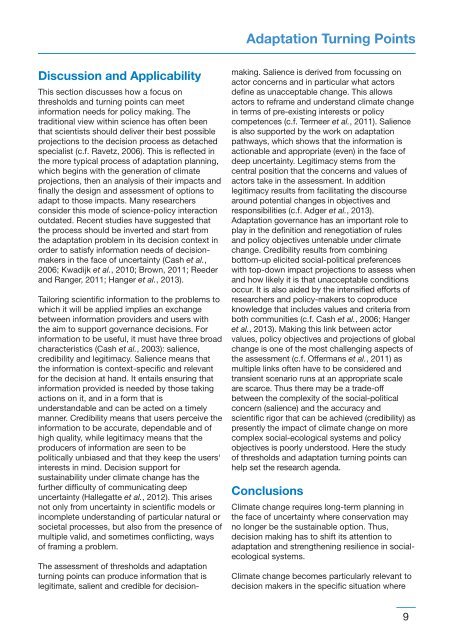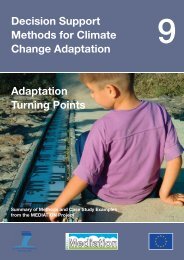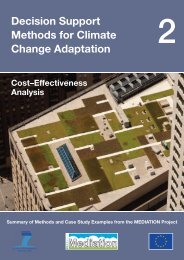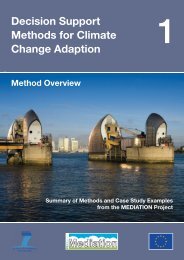Download all Technical Policy Briefing Notes in a single ... - Mediation
Download all Technical Policy Briefing Notes in a single ... - Mediation
Download all Technical Policy Briefing Notes in a single ... - Mediation
- No tags were found...
You also want an ePaper? Increase the reach of your titles
YUMPU automatically turns print PDFs into web optimized ePapers that Google loves.
Adaptation Turn<strong>in</strong>g Po<strong>in</strong>tsDiscussion and ApplicabilityThis section discusses how a focus onthresholds and turn<strong>in</strong>g po<strong>in</strong>ts can meet<strong>in</strong>formation needs for policy mak<strong>in</strong>g. Thetraditional view with<strong>in</strong> science has often beenthat scientists should deliver their best possibleprojections to the decision process as detachedspecialist (c.f. Ravetz, 2006). This is reflected <strong>in</strong>the more typical process of adaptation plann<strong>in</strong>g,which beg<strong>in</strong>s with the generation of climateprojections, then an analysis of their impacts andf<strong>in</strong><strong>all</strong>y the design and assessment of options toadapt to those impacts. Many researchersconsider this mode of science-policy <strong>in</strong>teractionoutdated. Recent studies have suggested thatthe process should be <strong>in</strong>verted and start fromthe adaptation problem <strong>in</strong> its decision context <strong>in</strong>order to satisfy <strong>in</strong>formation needs of decisionmakers<strong>in</strong> the face of uncerta<strong>in</strong>ty (Cash et al.,2006; Kwadijk et al., 2010; Brown, 2011; Reederand Ranger, 2011; Hanger et al., 2013).Tailor<strong>in</strong>g scientific <strong>in</strong>formation to the problems towhich it will be applied implies an exchangebetween <strong>in</strong>formation providers and users withthe aim to support governance decisions. For<strong>in</strong>formation to be useful, it must have three broadcharacteristics (Cash et al., 2003): salience,credibility and legitimacy. Salience means thatthe <strong>in</strong>formation is context-specific and relevantfor the decision at hand. It entails ensur<strong>in</strong>g that<strong>in</strong>formation provided is needed by those tak<strong>in</strong>gactions on it, and <strong>in</strong> a form that isunderstandable and can be acted on a timelymanner. Credibility means that users perceive the<strong>in</strong>formation to be accurate, dependable and ofhigh quality, while legitimacy means that theproducers of <strong>in</strong>formation are seen to bepolitic<strong>all</strong>y unbiased and that they keep the users‘<strong>in</strong>terests <strong>in</strong> m<strong>in</strong>d. Decision support forsusta<strong>in</strong>ability under climate change has thefurther difficulty of communicat<strong>in</strong>g deepuncerta<strong>in</strong>ty (H<strong>all</strong>egatte et al., 2012). This arisesnot only from uncerta<strong>in</strong>ty <strong>in</strong> scientific models or<strong>in</strong>complete understand<strong>in</strong>g of particular natural orsocietal processes, but also from the presence ofmultiple valid, and sometimes conflict<strong>in</strong>g, waysof fram<strong>in</strong>g a problem.The assessment of thresholds and adaptationturn<strong>in</strong>g po<strong>in</strong>ts can produce <strong>in</strong>formation that islegitimate, salient and credible for decisionmak<strong>in</strong>g.Salience is derived from focuss<strong>in</strong>g onactor concerns and <strong>in</strong> particular what actorsdef<strong>in</strong>e as unacceptable change. This <strong>all</strong>owsactors to reframe and understand climate change<strong>in</strong> terms of pre-exist<strong>in</strong>g <strong>in</strong>terests or policycompetences (c.f. Termeer et al., 2011). Salienceis also supported by the work on adaptationpathways, which shows that the <strong>in</strong>formation isactionable and appropriate (even) <strong>in</strong> the face ofdeep uncerta<strong>in</strong>ty. Legitimacy stems from thecentral position that the concerns and values ofactors take <strong>in</strong> the assessment. In additionlegitimacy results from facilitat<strong>in</strong>g the discoursearound potential changes <strong>in</strong> objectives andresponsibilities (c.f. Adger et al., 2013).Adaptation governance has an important role toplay <strong>in</strong> the def<strong>in</strong>ition and renegotiation of rulesand policy objectives untenable under climatechange. Credibility results from comb<strong>in</strong><strong>in</strong>gbottom-up elicited social-political preferenceswith top-down impact projections to assess whenand how likely it is that unacceptable conditionsoccur. It is also aided by the <strong>in</strong>tensified efforts ofresearchers and policy-makers to coproduceknowledge that <strong>in</strong>cludes values and criteria fromboth communities (c.f. Cash et al., 2006; Hangeret al., 2013). Mak<strong>in</strong>g this l<strong>in</strong>k between actorvalues, policy objectives and projections of globalchange is one of the most ch<strong>all</strong>eng<strong>in</strong>g aspects ofthe assessment (c.f. Offermans et al., 2011) asmultiple l<strong>in</strong>ks often have to be considered andtransient scenario runs at an appropriate scaleare scarce. Thus there may be a trade-offbetween the complexity of the social-politicalconcern (salience) and the accuracy andscientific rigor that can be achieved (credibility) aspresently the impact of climate change on morecomplex social-ecological systems and policyobjectives is poorly understood. Here the studyof thresholds and adaptation turn<strong>in</strong>g po<strong>in</strong>ts canhelp set the research agenda.ConclusionsClimate change requires long-term plann<strong>in</strong>g <strong>in</strong>the face of uncerta<strong>in</strong>ty where conservation mayno longer be the susta<strong>in</strong>able option. Thus,decision mak<strong>in</strong>g has to shift its attention toadaptation and strengthen<strong>in</strong>g resilience <strong>in</strong> socialecologicalsystems.Climate change becomes particularly relevant todecision makers <strong>in</strong> the specific situation where9





